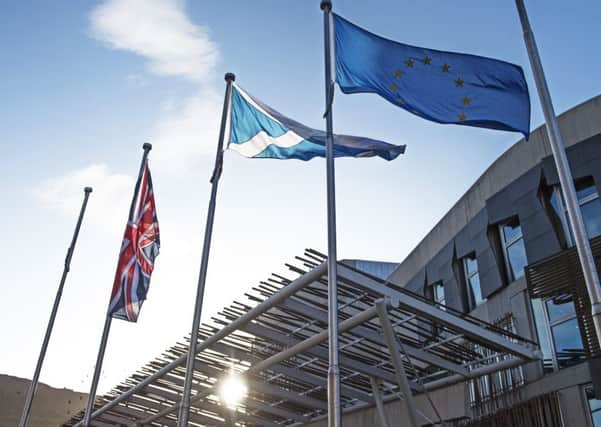Brexit: Rows over flags and bells should not obscure this one key fact – leader comment


The Scottish Parliament’s decision to take down the European Union flag at 11pm on Friday, 31 January, at the stroke of Brexit, has caused some controversy. Brexit Secretary Michael Russell said the Scottish Government would seek to reverse the decision, arguing that “the flag is not only a symbol of our solidarity with the 27 [other member states] and all EU citizens in Scotland, it also represents our wish as a nation to return to membership of a union we never voted to leave”.
However, in a sense, removing the flag could be seen as a symbolic way to demonstrate what we are losing. Leaving the flagpole empty might make the same point that Russell wants to make – that a large majority of people in Scotland voted to remain in the EU – with a degree of poignancy.
Advertisement
Hide AdAdvertisement
Hide AdThe Holyrood authorities should not be blamed for their decision, with a spokesman saying it simply reflected the “legal position that the UK will no longer be a member of the EU from January 31”. Keeping the flag would be a political act, so it’s a matter for MSPs to decide.
Whether they vote to overturn the decision or not, the idea of returning to the EU should most certainly not be ruled out. Guy Verhofstadt, who chairs the EU Brexit Steering Group, told BBC Radio 4’s Today programme that he thought it would happen – eventually.
“There will be a generation, the young generation coming in the coming decades, who will say later, ‘We want to go back’,” he said, although he added it might not happen in his lifetime.
The UK is about to find out what the reality of Brexit is, compared to the vision portrayed ahead of the 2016 referendum. If it turns out to be as bad as the worst predictions, supporters of this act of folly will doubtless try to find all manner of excuses to explain away the problems – the lost jobs, homes and economic decline. They are likely to try to insist that the UK is in trouble not because of Brexit but because Boris Johnson’s deal was not the right one, that it was an ‘impure’ form of true Brexit.
Indeed Nigel Farage appears to have started using this line of argument already with his claim that the UK Government is “embarrassed by Brexit” because it is not insisting that Big Ben, currently silenced due to maintenance work, goes symbollically ‘bong’ on 31 January at a cost of £500,000 – a claim as ridiculous as Brexit is reckless with the fate of everyone in Britain.